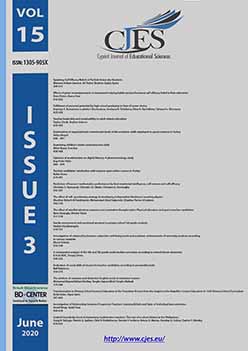Investigation of relationship between subjective well-being levels and academic achievements of university students according to various variables
Investigation of relationship between subjective well-being levels and academic achievements of university students according to various variables
Author(s): Murat GökalpSubject(s): Education, Higher Education
Published by: Birlesik Dunya Yenilik Arastirma ve Yayincilik Merkezi
Keywords: Faculty; level of well-being; subjective well-being; university students;
Summary/Abstract: In this study, it is aimed to determine and evaluate the relationship between the subjective well-being levels of the university students and their academic achievement according to various variables. The study group consisted of 600 students from various faculties of Samsun 19 Mayıs University. Subjective Well-being Scale developed by Tuzgöl-Dost (2004) and academic achievement scores prepared by the researcher were used as data collection tools. The subjective well-being scale, which consists of 46 items, aims to measure the subjective well-being of individuals. Students' academic achievement scores were obtained with personal information form. In the study, simple regression analysis was performed to examine the predictive power of subjective well-being on academic achievement. According to the results of the regression analysis, subjective well-being significantly predicted positively (β = .330, t = 54.704, p <.01) and 5% of the variance in subjective wellbeing scores. According to these results, as the subjective well-being of the participants increased, their academic achievement levels increased. The level of subjective well-being of the students differed according to the number of faculty and the number of siblings they studied. These findings were discussed in the light of the literature and suggestions for practitioners and researchers were presented.
Journal: Kıbrıslı Eğitim Bilimleri Dergisi
- Issue Year: 15/2020
- Issue No: 3
- Page Range: 532-539
- Page Count: 8
- Language: English

